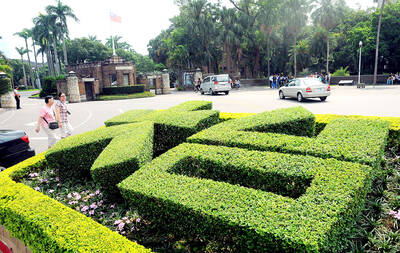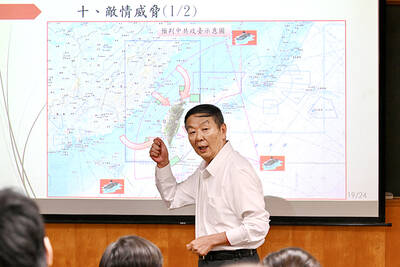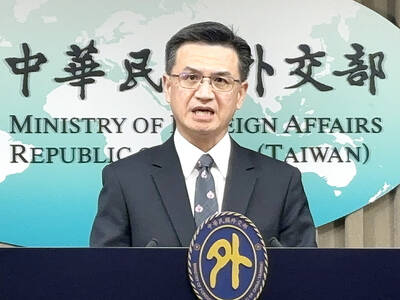US President Barack Obama on Friday signed into law H.R. 1151 — an act concerning participation of Taiwan in the International Civil Aviation Organization (ICAO) — and announced the US government’s full support for Taiwan’s participation in the organization.
While signing the act into law, Obama also issued a statement saying that Washington fully supports Taiwan becoming part of international organizations where statehood is not a requirement for membership and encourages the nation’s meaningful participation — where appropriate — in organizations of which it cannot be a member.
The US administration has publicly supported Taiwan’s participation in the ICAO and will continue to do so, the statement said.
“Consistent with my constitutional authority to conduct foreign affairs, my Administration shall construe the Act to be consistent with the ‘one China’ policy of the United States, which remains unchanged, and shall determine the measures best suited to advance the overall goal of Taiwan’s participation in the ICAO,” Obama said in the statement.
The US president said that some sections of the act contain impermissibly mandatory language purporting to direct the US Secretary of State to undertake certain diplomatic initiatives and to report to the US Congress on the progress of those initiatives.
“Consistent with longstanding constitutional practice, my Administration will interpret and implement these sections in a manner that does not interfere with my constitutional authority to conduct diplomacy and to protect the confidentiality of diplomatic communications,” Obama said in the statement.
The US House of Representatives and the US Senate each passed resolutions supporting Taiwan’s ICAO bid earlier this month. As their versions were the same, the two chambers moved quickly to pass the bill.
US Senator Robert Menendez, chairman of the Senate Committee on Foreign Relations, who initiated the senatorial resolution, said that the signing into law of the act marks a step forward in Taiwan’s pursuit of ICAO participation. Menendez added that he believes Taiwan will contribute greatly to the aviation organization and its bid should not be turned down.
US Representative Ed Royce, chairman of the House Committee on Foreign Affairs, who introduced the legislation, has previously said Taiwan’s exclusion from the ICAO is extremely disadvantageous to the millions of passengers flying between Taiwan and the US annually.
The number of people traveling between the two countries is expected to increase significantly after Taiwanese nationals were granted visa-free entry to the US last year.
Meanwhile, Ministry of Foreign Affairs spokesperson Anna Kao (高安) yesterday expressed the Republic of China government’s gratitude to Obama for singing the act into law, describing it as a positive development.
Congress finalizing the legislation and Obama signing it into law showed that the US’ administrative, legislative and local governments all support Taiwan’s ICAO bid, Kao added.
Kao said the ICAO is scheduled to hold a meeting in Montreal, Canada, in September and the ministry is devising a strategy for it.

Taiwan has experienced its most significant improvement in the QS World University Rankings by Subject, data provided on Sunday by international higher education analyst Quacquarelli Symonds (QS) showed. Compared with last year’s edition of the rankings, which measure academic excellence and influence, Taiwanese universities made great improvements in the H Index metric, which evaluates research productivity and its impact, with a notable 30 percent increase overall, QS said. Taiwanese universities also made notable progress in the Citations per Paper metric, which measures the impact of research, achieving a 13 percent increase. Taiwanese universities gained 10 percent in Academic Reputation, but declined 18 percent

RETHINK? The defense ministry and Navy Command Headquarters could take over the indigenous submarine project and change its production timeline, a source said Admiral Huang Shu-kuang’s (黃曙光) resignation as head of the Indigenous Submarine Program and as a member of the National Security Council could affect the production of submarines, a source said yesterday. Huang in a statement last night said he had decided to resign due to national security concerns while expressing the hope that it would put a stop to political wrangling that only undermines the advancement of the nation’s defense capabilities. Taiwan People’s Party Legislator Vivian Huang (黃珊珊) yesterday said that the admiral, her older brother, felt it was time for him to step down and that he had completed what he

BULLY TACTICS: Beijing has continued its incursions into Taiwan’s airspace even as Xi Jinping talked about Taiwan being part of the Chinese family and nation China should stop its coercion of Taiwan and respect mainstream public opinion in Taiwan about sovereignty if its expression of goodwill is genuine, the Ministry of Foreign Affairs (MOFA) said yesterday. Ministry spokesman Jeff Liu (劉永健) made the comment in response to media queries about a meeting between former president Ma Ying-jeou (馬英九) and Chinese President Xi Jinping (習近平) the previous day. Ma voiced support for the so-called “1992 consensus,” while Xi said that although the two sides of the Taiwan Strait have “different systems,” this does not change the fact that they are “part of the same country,” and that “external

UNDER DISCUSSION: The combatant command would integrate fast attack boat and anti-ship missile groups to defend waters closest to the coastline, a source said The military could establish a new combatant command as early as 2026, which would be tasked with defending Taiwan’s territorial waters 24 nautical miles (44.4km) from the nation’s coastline, a source familiar with the matter said yesterday. The new command, which would fall under the Naval Command Headquarters, would be led by a vice admiral and integrate existing fast attack boat and anti-ship missile groups, along with the Naval Maritime Surveillance and Reconnaissance Command, said the source, who asked to remain anonymous. It could be launched by 2026, but details are being discussed and no final timetable has been announced, the source